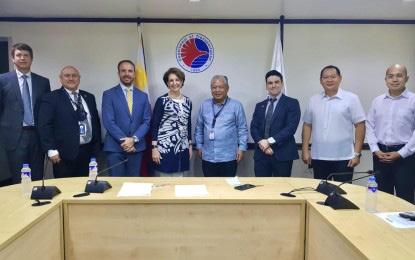
2 minute read
Germany expands dev’t programs in Mindanao
The German government will continue supporting peace-building efforts in Mindanao through livelihood initiatives and various projects on youth and women empowerment.
In an Embassy report dated October 13, German Ambassador to the Philippines Anke Reiffenstuel said they “are convinced that a successful and inclusive peace process will increase prosperity and social cohesion not only in the Philippines, but also in this highly interconnected region.”
Advertisement
“We are aiming at expanding our partnerships with the Philippines, knowing that the Indo-Pacific region is of growing relevance in the political as well as economic sphere,” she added.
Germany is currently providing more than PHP2 billion worth of development programs in coordination with the Philippine government and 70 organizations on the ground.
The projects include building institutions in the Bangsamoro Autonomous Region in Muslim Mindanao, reintegrating former combatants into society, and empowering key stakeholders such as women, the youth, and indigenous people. Also included are financial support for projects in key sectors such as land rights, disaster risk reduction, health, human rights, climate change, and livelihood, especially in agriculture.
“In our view, the peace process can


only be successful if all stakeholders are actively involved in it from early on,” Reiffenstuel said. One of the Germanfunded projects is the Deutsche Gesellschaft für Internationale Zusammenarbeit’s (GIZ) Youth for a Culture of Peace and NonViolence in Mindanao (YOUCAP) which seeks to keep the youth away from armed terrorist groups.
YOUCAP actively works with Sangguniang Kabataan officials in four local governments in Regions 10 (Northern Mindanao) and 13 (Caraga) to develop local youth development plans and covers about 100,000 young Filipinos -- 21,500 of them classified as vulnerable.
The GIZ also implements a project line called DeveloPPP aided by the German Federal Ministry for Economic Cooperation and Development.
One of the major sectors assisted by DeveloPPP projects is agriculture in Mindanao, particularly coffee farming, while GIZ helps in training and capacity-building for farmers’ groups.
“We help the farmers produce a better crop through education,” GIZ country director Immanuel Gebhardt said. “Harvesting better crops leads to a secure and continuous supply of coffee for companies and more revenue for the coffee farmers in Mindanao which helps them get out of poverty.”
Some 1,565 coffee farmers in Bukidnon and Sultan Kudarat have been trained under the initiative.
From producing only 235 kilograms of coffee per hectare in 2018, they saw a 133.62-percent increase in harvest in 2020 at 549 kilograms per hectare, the German Embassy said.
In addition, the German Foreign Federal Foreign Office is working with Relief International on a new project called Women Engaged in Responsive Solutions to Conflicts and Violence in Mindanao (WeThe project, which started September 15, aims to increase the participation of Bangsamoro women in eight municipalities involving 40 villages while providing them with livelihood opportunities.
The project conducts workshops to equip local government units, women-led civil society organizations, community members, and other stakeholders with the skills to develop better gender and development plans.
“During my trips to Mindanao, I have always been impressed by the well-structured approach and concept of the projects our partner organizations are implementing,” Reiffenstuel said.
“Overall, sustainability can be achieved through close coordination with Philippine authorities, between German implementing partners as well as international donors.” (PNA/ By Joyce Ann L. Rocamora)










